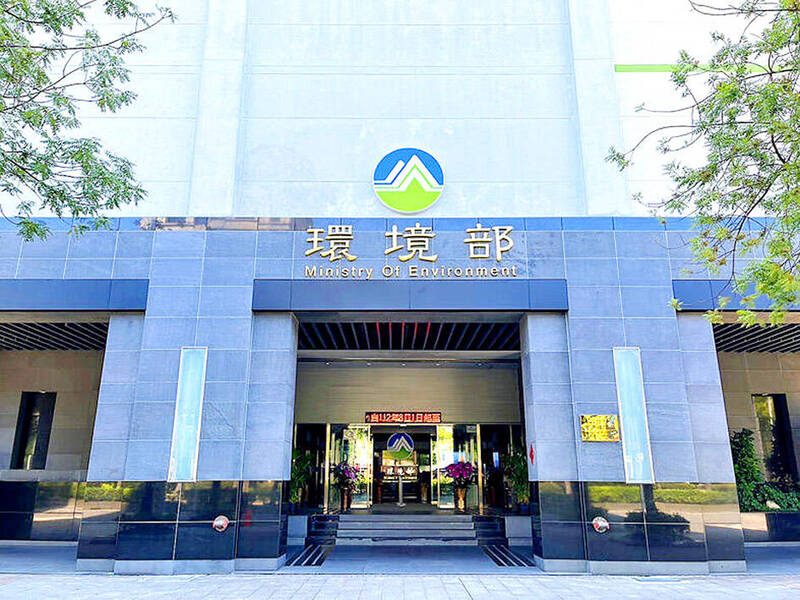The subsidy for the tuition of participants of the Net Zero Green-Collar Talent Incubation Program has been expanded to include people with disabilities and those with a medium-low income, the Ministry of Environment said on Friday.
The ministry’s National Environmental Research Academy launched the program in March in collaboration with 32 universities nationwide to train talent for the rapidly growing green sector.
Previously, people from low-income households could enroll for free, while full-time students younger than 30 would be given a 50 percent discount, as long as they pass the program’s examination the first time. The course fee is NT$12,000.

Photo: Chen Chia-yi, Taipei Times
The program’s first session, for which registration opened on April 1, had a slot for 40 trainees. Registration was full and closed 16 minutes later, the ministry said.
However, more than 80 percent of the session’s applicants were ineligible for tuition subsidies, it said.
Participants were aged 37 on average, and 60 percent of them were women, the ministry said, adding that their jobs ranged from engineers, sales representatives and administrative assistants to accountants, general affairs personnel and college teachers.
That reflected people’s strong motivation to learn, as well as the importance they attached to cultivating net zero expertise and changing careers to green-collar jobs, it said.
Democratic Progressive Party Legislator Liu Chien-kuo (劉建國) has suggested that the academy extend the subsidy to people from lower-middle income households and those with physical or mental disabilities, based on the principle of “economizing on all but education.”
Academy director Liu Tsung-yung (劉宗勇) on Friday said that it agreed to include more people in the subsidy scheme to reduce the financial burden on applicants from disadvantaged backgrounds.
People with disabilities or from lower-middle income households are now eligible to apply for the full subsidy, he said.
However, they must complete the training and pass the examination the first time, Liu said, adding that people who fail the first exam but pass the retake would not be granted the subsidy.
People who have registered for the program prior to the changes can still apply for the subsidy if they are eligible, he said.
The ministry said at least 60 sessions would be launched by 32 universities to train more than 2,400 people by the end of this year.
The program provides three examinations and is expected to train at least 3,500 people every year, it said.
The first examination for this year would be held in late August, Liu said, urging college students to take the opportunity of cultivating net zero knowledge and skills during the summer vacation.

The manufacture of the remaining 28 M1A2T Abrams tanks Taiwan purchased from the US has recently been completed, and they are expected to be delivered within the next one to two months, a source said yesterday. The Ministry of National Defense is arranging cargo ships to transport the tanks to Taiwan as soon as possible, said the source, who is familiar with the matter. The estimated arrival time ranges from late this month to early next month, the source said. The 28 Abrams tanks make up the third and final batch of a total of 108 tanks, valued at about NT$40.5 billion

Two Taiwanese prosecutors were questioned by Chinese security personnel at their hotel during a trip to China’s Henan Province this month, the Mainland Affairs Council (MAC) said yesterday. The officers had personal information on the prosecutors, including “when they were assigned to their posts, their work locations and job titles,” MAC Deputy Minister and spokesman Liang Wen-chieh (梁文傑) said. On top of asking about their agencies and positions, the officers also questioned the prosecutors about the Cross-Strait Joint Crime-Fighting and Judicial Mutual Assistance Agreement, a pact that serves as the framework for Taiwan-China cooperation on combating crime and providing judicial assistance, Liang

A group from the Taiwanese Designers in Australia association yesterday represented Taiwan at the Midsumma Pride March in Melbourne. The march, held in the St. Kilda suburb, is the city’s largest LGBTQIA+ parade and the flagship event of the annual Midsumma Festival. It attracted more than 45,000 spectators who supported the 400 groups and 10,000 marchers that participated this year, the association said. Taiwanese Designers said they organized a team to march for Taiwan this year, joining politicians, government agencies, professionals and community organizations in showing support for LGBTQIA+ people and diverse communities. As the first country in Asia to legalize same-sex

MOTIVES QUESTIONED The PLA considers Xi’s policies toward Taiwan to be driven by personal considerations rather than military assessment, the Epoch Times reports Chinese President Xi Jinping’s (習近平) latest purge of the Chinese People’s Liberation Army (PLA) leadership might have been prompted by the military’s opposition to plans of invading Taiwan, the Epoch Times said. The Chinese military opposes waging war against Taiwan by a large consensus, putting it at odds with Xi’s vision, the Falun Gong-affiliated daily said in a report on Thursday, citing anonymous sources with insight into the PLA’s inner workings. The opposition is not the opinion of a few generals, but a widely shared view among the PLA cadre, the Epoch Times cited them as saying. “Chinese forces know full well that